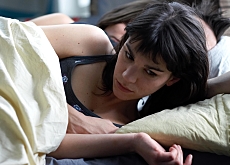
Das Fräulein picks up the Golden Leopard

Das Fräulein (The Waitress), by Swiss director Andrea Staka, has won the Golden Leopard at the 59th Locarno International Film Festival.
But the choice of the German/Swiss co-production, which looks at three generations of women from the former Yugoslavia living in Switzerland, was not without controversy.
It emerged on Wednesday that Barbara Albert, one of the jury, had co-written Das Fräulein with Staka and hadn’t considered it necessary to alert anyone to the fact.
Albert stepped down on Saturday, saying she wanted to avoid any talk of bias among the jury.
Another piece of off-screen drama meant Frédéric Maire, the festival’s artistic director, was watching the ceremony from his hospital bed, having collapsed on stage in front of 8,000 people on Friday night.
Festival president Marco Solari said Maire was exhausted, having underestimated the scale of the job.
Personal
Following her debut at Locarno in 2002 in the Leopards of Tomorrow short film section, Staka returned with her first full-length feature – the only Swiss entry in the main competition – which beat off 20 other films from 15 countries.
Das Fräulein traces the developing friendship between Ruza (Mirjana Karanovic), a fifty-something Zurich restaurateur who left Yugoslavia two decades ago, and Ana (Marija Skaricic), a seemingly carefree and outgoing Bosnian in her early twenties who gets a job at Ruza’s canteen.
While Ruza never looks back to the past and has no feelings of nostalgia, her 60-year-old employer, Mila, has a very different outlook. She also arrived in Switzerland several decades ago, but her only dream is to build a house in her homeland, Croatia.
“Das Fräulein is a personal film that connects my two worlds,” Staka said. “My parents came from Bosnia and Croatia. I wanted to explore displacement in our era; more and more people are moving between different cultures – be they refugees, travellers or simply homeless.”
And then there were five
While most critics considered Das Fräulein the best film in competition, it attracted unnecessary raised eyebrows when the Austrian director and writer Barbara Albert became the second of the seven-member jury for the main competition to step down.
Festival organisers claimed on Wednesday evening they had only learnt of Albert’s conflict of interest after the festival had begun, but Swiss producer and director Samir (Snow White) said he had told Frédéric Maire in the middle of July that having Albert on the jury was “not a good idea”.
According to Samir, Maire replied that this wasn’t a problem since Albert would step out of the room when Das Fräulein was being discussed.
Just before the festival began, French actress Emmanuelle Devos stood down citing personal reasons.
Other prizes
The Golden Leopard in the new Filmmakers of the Present competition, which according to the organisers “brings a new wave of innovation and originality to the festival”, was won by Verfolgt (Persecuted), from German director Angelina Maccarone.
The Filmmakers of the Present award for Best First Feature went to L’Année Suivante (The Following Year) by French director Isabelle Czajka.
The Prix du Public went to Das Leben der Anderen (The Life of Others), a critical and commercial hit this year in Germany, directed by Florian Henckel-Donnersmarck.
And in another Swiss success, the Golden Cub for the best film in the Leopards of Tomorrow category went to Nachtflattern (Nightfluttering), the 12-minute graduation film of Zurich film student Carmen Stadler.
swissinfo, Thomas Stephens in Locarno
The Golden Leopard: Das Fräulein, Andrea Staka (Germany/Switzerland)
Best direction: Laurent Achard for Le Dernier des Fous (The Last of the Madmen) (France/Belgium)
The Special Jury Prize: Half Nelson, Ryan Fleck (US)
Best Actor: Burghart Klaussner for Der Mann von der Botschaft (The Man from the Embassy), Dito Tsintsadze (Germany)
Best Actress: Amber Tamblyn for Stephanie Daley, Hilary Brougher (US)
The Locarno International Film Festival was founded in 1946. It is held in August and is attended by around 90,000 visitors and 4,000 professionals. The main award is the Golden Leopard.
21 films were in competition and 18 films were shown in the Piazza Grande.
Michael Mann’s Miami Vice opened the festival and Gus Van Sant’s To Die For closed it.
Russian director Aleksandr Sokurov received the Leopard of Honour and American actor Willem Dafoe received an award for excellence.
2006 – “Das Fräulein”, Andrea Staka, Switzerland
2005 – “Nine lives”, Rodrigo Garcia, United States
2004 – “Private”, Saverio Costanzo, Italy
2003 – “Khamosh Pani”, Sabiha Sumar, Pakistan
2002 – “Das Verlangen”, Iain Dilthey, Germany
2001 – “Alla rivoluzione sulla due cavalli”, Maurizio Sciarra, Italy
2000 – “Baba”, Wang Shuo, China
1999 – “Peau d’homme, coeur de bête”, Hélène Angel, France
1998 – “Zhao Xiansheng”, Lü Yue, China
1997 – “Ayneh”, Jafar Panahi, Iran
1996 – “Nénette et Boni”, Claire Denis, France

In compliance with the JTI standards
More: SWI swissinfo.ch certified by the Journalism Trust Initiative





























You can find an overview of ongoing debates with our journalists here . Please join us!
If you want to start a conversation about a topic raised in this article or want to report factual errors, email us at english@swissinfo.ch.